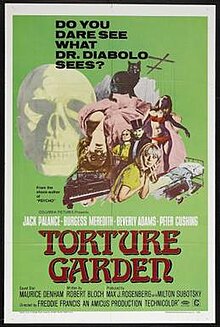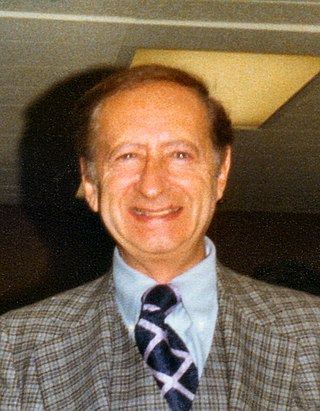
Robert Albert Bloch was an American fiction writer, primarily of crime, psychological horror and fantasy, much of which has been dramatized for radio, cinema and television. He also wrote a relatively small amount of science fiction. His writing career lasted 60 years, including more than 30 years in television and film. He began his professional writing career immediately after graduation from high school, aged 17. Best known as the writer of Psycho (1959), the basis for the film of the same name by Alfred Hitchcock, Bloch wrote hundreds of short stories and over 30 novels. He was a protégé of H. P. Lovecraft, who was the first to seriously encourage his talent. However, while he started emulating Lovecraft and his brand of cosmic horror, he later specialized in crime and horror stories working with a more psychological approach.

"The Pit and the Pendulum" is a short story by American writer Edgar Allan Poe and first published in 1842 in the literary annual The Gift: A Christmas and New Year's Present for 1843. The story is about the torments endured by a prisoner of the Spanish Inquisition, though Poe skews historical facts. The narrator of the story describes his experience of being tortured. The story is especially effective at inspiring fear in the reader because of its heavy focus on the senses, such as sound, emphasizing its reality, unlike many of Poe's stories which are aided by the supernatural. The traditional elements established in popular horror tales at the time are followed, but critical reception has been mixed. The tale has been adapted to film several times.
Amicus Productions was a British film production company, based at Shepperton Studios, England, active between 1962 and 1977. It was founded by American producers and screenwriters Milton Subotsky and Max Rosenberg.

Dr Terror's House of Horrors is a 1965 British anthology horror film from Amicus Productions, directed by veteran horror director Freddie Francis, written by Milton Subotsky, and starring Peter Cushing and Christopher Lee.

Gene Curtis Harrington was an American film and television director whose work included experimental films and horror films. He is considered one of the forerunners of New Queer Cinema.

The Raven is a 1935 American horror film directed by Louis Friedlander and starring Boris Karloff and Béla Lugosi. Billed as having been "suggested by" Edgar Allan Poe's 1845 poem of the same title, excerpts of which are quoted at a few points in the film, it was adapted from an original screenplay by David Boehm. Lugosi stars as a neurosurgeon obsessed with Poe who has a torture chamber in his basement, and Karloff plays an escaped murderer on the run from the police who Lugosi manipulates into doing his dirty work.
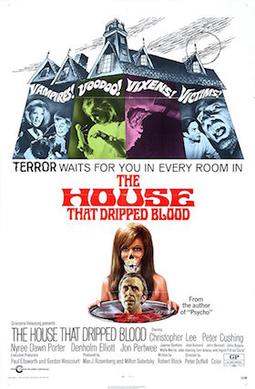
The House That Dripped Blood is a 1971 British anthology horror film directed by Peter Duffell and distributed by Amicus Productions. It stars Christopher Lee, Peter Cushing, Nyree Dawn Porter, Denholm Elliott, and Jon Pertwee. The film is a collection of four short stories concerning a series of inhabitants of the eponymous building. All of the stories were originally written, and subsequently scripted, by Robert Bloch.
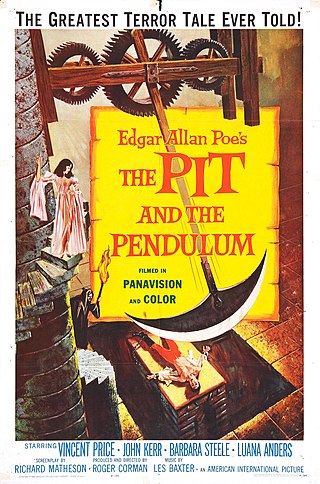
The Pit and the Pendulum is a 1961 horror film directed by Roger Corman, starring Vincent Price, Barbara Steele, John Kerr, and Luana Anders. The screenplay by Richard Matheson was loosely inspired by Edgar Allan Poe's 1842 short story of the same name. Set in sixteenth-century Spain, the story is about a young Englishman who visits a forbidding castle to investigate his sister's mysterious death. After a series of horrific revelations, apparently ghostly appearances and violent deaths, the young man becomes strapped to the titular torture device by his lunatic brother-in-law during the film's climactic sequence.

The Deadly Bees is a 1967 British horror film based on H. F. Heard's 1941 novel A Taste for Honey. It was directed by Freddie Francis, and stars Suzanna Leigh, Guy Doleman, and Frank Finlay. The original screenplay was by Robert Bloch but was rewritten by Anthony Marriott. The film was released theatrically in the United States in 1967 and was featured in a 1998 episode of Mystery Science Theater 3000.

The Skull is a 1965 British horror film directed by Freddie Francis for Amicus Productions, and starring the frequently paired horror actors Peter Cushing and Christopher Lee, alongside Patrick Wymark, Jill Bennett, Nigel Green, Patrick Magee and Peter Woodthorpe.

American poet and short story writer Edgar Allan Poe has had significant influence in television and film. Many are adaptations of Poe's work, others merely reference it.
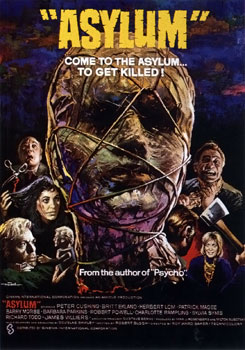
Asylum is a 1972 British anthology horror film made by Amicus Productions. The film was directed by Roy Ward Baker and produced by Milton Subotsky. Robert Bloch wrote the script, adapting four of his own short stories.

Edgar Allan Poe has appeared in popular culture as a character in books, comics, film, and other media. Besides his works, the legend of Poe himself has fascinated people for generations. His appearances in popular culture often envision him as a sort of "mad genius" or "tormented artist", exploiting his personal struggles. Many depictions of Poe interweave elements of his life with his works, in part due to Poe's frequent use of first-person narrators, suggesting an erroneous assumption that Poe and his characters are identical.

The Raven is a stylized silent 1915 American biographical film of Edgar Allan Poe starring Henry B. Walthall as Poe. The film was written and directed by Charles Brabin from a 1904 play and 1909 novel by George C. Hazelton.
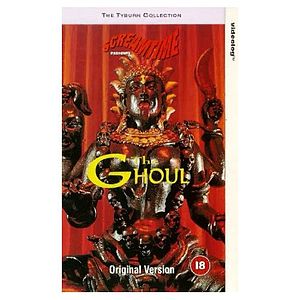
The Ghoul is a 1975 British horror film directed by Freddie Francis and starring Peter Cushing, John Hurt, Alexandra Bastedo, Veronica Carlson, Gwen Watford, Don Henderson and Ian McCulloch. Francis made the film as a favour for his son, who produced it for Tyburn Film Productions.
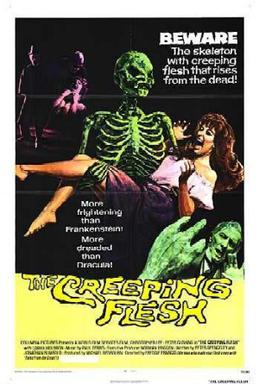
The Creeping Flesh is a 1973 British horror film directed by Freddie Francis, written by Peter Spenceley, and starring Christopher Lee, Peter Cushing, and Lorna Heilbron.
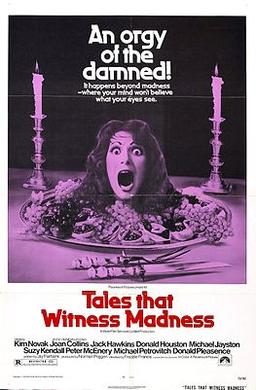
Tales That Witness Madness is a 1973 British anthology horror film produced by Norman Priggen, directed by veteran horror director Freddie Francis, written by actress Jennifer Jayne.

The Brain, also known as Vengeance and Ein Toter sucht seinen Mörder, is a 1962 UK-West German co-production science fiction thriller film directed by Freddie Francis, and starring Anne Heywood and Peter van Eyck. It is adapted from the 1942 Curt Siodmak novel Donovan's Brain, and in this film, differing from earlier adaptations, the dead man seeks his murderer through hypnotic contact with the doctor keeping his brain alive.

The Psychopath is a 1966 British horror film directed by Freddie Francis and starring Patrick Wymark and Margaret Johnston. It was written by Robert Bloch and was an Amicus production.
